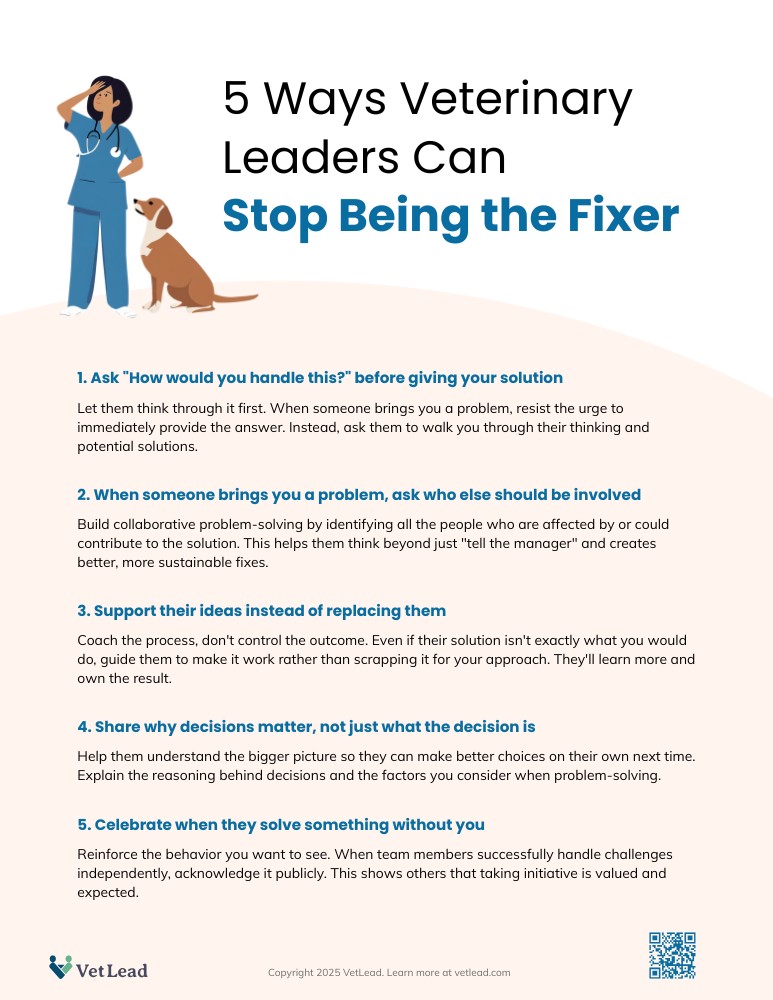You know the feeling. You start the day with a plan, but before long you're caught up in drama, fixing mistakes, and handling whatever went wrong on the floor.
A lot of times when I go into veterinary practices, I hear from managers and leaders and supervisors, and one of the things that always shows up is this: "I spend all day putting out fires. I spend all day dealing with challenges that people bring to me."
It's easy to feel like your job is to keep putting out fires so the practice can run. But here's the question that matters most: Have you taught your team that this is how it works?
When we spend all day solving problems, we're not failing at leadership. We're reinforcing a habit. And we're not bad people when this happens to us. But it is a pattern we've created.
Why Your Veterinary Team Keeps Bringing You Everything
Most people don't pass a problem to their boss because they want to avoid work. They do it because that's what they think they're supposed to do. That's what they've been trained to do.
Sometimes they've been told directly: "Hey, you have to bring those decisions to me. I'll make them because I'm in management." And that may not have been your intention, but what people hear is that the only right answer to this problem is your answer. They're not supposed to have an answer, they're just supposed to give it to you.
Maybe they tried to handle something on their own and got told it was wrong or needed to be redone. Now the risk of making their own decisions, the risk of being empowered, is more than they want to assume within their role.
So they think, "Well, it's not my job to solve the problems. I'll just funnel them all up."
What Happens When You Own All the Problems
When leaders own all the problems, the team owns none.
If the only way something gets fixed is by coming to you, people start thinking that's the right process. They don't feel responsible for outcomes; they feel responsible for reporting issues.
That's when we start thinking, and even saying things like, "Why hasn't this been dealt with yet?" or "I told them last week and nothing happened." It's not because the team doesn't care. It's because they believe their involvement ends when they tell you about it.
What we end up with is a culture where what you do with problems is you tell somebody about them. And ultimately we want to shift to a culture where what you do with problems is you go dive in and solve them.
What Real Accountability Looks Like in a Veterinary Hospital

I watched this happen recently in a hospital, where somebody said, "I got in trouble because my boss didn't know that we were doing these things." But here's what actually happened: They had a team of people who thought about changing some of the things they were doing. All the people who were in the process were involved in the conversation.
Here's the thing: the boss didn't actually need to be part of solving the problem. The team had it handled. But we all have this human need to feel included, right? A simple "Hey, here's where we're headed with this, we'd love your thoughts" would have taken care of that without requiring the boss to actually solve anything or slow down the process.
Things move forward faster, more effectively, more efficiently when problems are solved by the people that are encountering them, closer to the challenges, and in a collaborative way.
That's what we want: a fully empowered team that's thinking on a daily basis how to make the practice better, rather than thinking, "Why didn't management fix the things I told them about?"
You Didn't Get Magical Powers With Your Title
There is no magical management dust. We didn't get smarter and better and more equipped on the day we got a title. It doesn't work that way.
It doesn't matter if you've been there 20 years and they've been there 20 minutes. Other people can have good ideas.
But many of us learned somewhere that leadership means being in control. That it's our job to have the answer. That belief doesn't build accountability, it builds dependency.
Think About It Like Homework
A metaphor I use is this: If you have a child and they bring you a homework question, you typically don't say, "Well, just write down 15, you'll get an A." Instead, you say, "Well hey, talk me through how you want to do that."
Because we want that child to learn so we don't have to do all their homework going forward.
But in the work world, we position ourselves differently because of outdated viewpoints on what management is supposed to do.

5 Ways Veterinary Leaders Can Stop Being the Fixer
Download this free resource, share it with leaders and teams. No email address required.
Your Job as a Leader
Think about leadership not as the person that solves the problems, but as the person that builds capability on your team so that they're better at solving problems.
Your job is to build capability. That means you aren’t spending all your time solving other people's problems. It doesn't mean you can't support them as they figure things out, but it involves them being capable of solving their challenges in ways that actually let you grow and thrive and scale as an organization.
Many leaders tell me they don't have time to coach their team because they're too busy fixing problems. But the truth is, those problems will keep coming back until the people who encounter them can handle them without sending everything your way.
What Changes When You Stop Being the Fixer
When you shift from owning all the problems to empowering your team to own them, things start to change:
- People think through solutions before they bring an issue to you
- Conversations about problems include the people affected
- Small improvements happen without waiting for formal approval
- The team starts owning results, not just completing tasks
You don't remove yourself from the process. You still guide and support. But you're no longer the only engine that moves the practice forward.
And that frees you to focus on what matters most: leading the team into the future instead of just surviving today.
The Question to Ask Yourself
If you feel like you're always putting out fires, ask yourself this: Have I built a team that brings me every fire, or have I built a team that knows how to put them out?
That's the difference between a culture of dependency and a culture of accountability.
And when you think about a nimble, healthy, forward-thinking, growth-oriented veterinary hospital, it's one where people come together and work on things that allow them to perform at a higher level. Whether it's a problem they encountered that they needed to fix, or an opportunity they thought about that they could capture.
Both things represent forward movement. And that's the kind of practice where people want to work, clients want to come, and leaders actually get to lead instead of just survive another day.
What do you think? Other veterinary pros want to hear from you! Share your experience in the comments below.